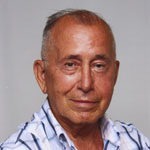Mi'kmaw Elder Dr. Daniel N. Paul
October 2013 Honorary Degree Recipient

Doctor of Laws (honoris causa)
An author whose book makes the past dance before our eyes. A social activist whose commitment to his people honours their experience and pushes others to confront historic racism. A recipient of the Order of Nova Scotia and the Order of Canada, who says his most valued honours are the eagle feathers, tobacco pouches, letters and more sent to him by students as thanks for helping them better understand the importance of according all peoples human dignity and respect.
Daniel N. Paul is the man behind these achievements. A Miâkmaq Elder, Mr. Paul has committed his life to promoting a better understanding of Miâkmaq and Maliseet history and culture. He is the author of the landmark book We Were Not the Savages, considered the most reliable text on the history of Aboriginal Peoples in the Atlantic provinces, and described by one writer as âa brilliant and painful account of how the Miâkmaqs were treated by the Europeans.â The book is used in Native Study courses in many high schools and universities in Canada and the United States. The book, and a complementary website Mr. Paul created, form âan irreplaceable contribution to the history of Atlantic Canada and to Aboriginal Peoples of Canada in general,â wrote Robin Oakley of ±«Óătvâs Department of Sociology and Social Anthropology, in preparing the nomination for this honorary degree.
Mr. Paul has dedicated his life to fighting racial discrimination and credits his family history with influencing his human rights work. His father, William Gabriel Paul, worked as a stevedore on the Saint John, New Brunswick, waterfront. After being laid off during the Great Depression, he and his family were forcibly relocated to the Indian Brook Reserve in Nova Scotia, a place they had never seen before. They were given a roll of tarpaper and told to build a shack. As Mr. Paul writes: âfrom birth, as Indians, we were treated as âWards of the Crownâ and treated as third class citizens at best. We had the same legal status as drunks and insane persons.â
Daniel grew up hunting, fishing and trapping, and as a young teenager sold magazines, seeds and greeting cards to earn money. At age 14, he set off for Boston. He eventually returned to Nova Scotia, stitching together what he has called a âself-educationâ and working for the Department of Indian Affairs. He is married and the father of three children.
Through those years, he embarked on community activism, including being the founding executive director of the Confederacy of Mainland Micmacs, initiating fundraising for a new community centre for the Indian Brook Reserve, and working to resolve land and treaty claims. He has served on the Nova Scotia Human Rights Commission, as a Commissioner of the Nova Scotia Police Review Board, as a member of the advisory council for ±«Óătvâs law program for Indigenous Blacks and Miâkmaqs, among other commissions, committees and councils.
When awarding Mr. Paul the Order of Nova Scotia, the provincial government lauded him for bringing new understanding and perspective to the past. One significant public expression of that shift in perspective involved efforts by Mr. Paul and others to have us rethink the naming of public buildings and landmarks. In his own words: âThe accomplishment that Iâm most proud of is that Iâve lobbied successfully to have the names of buildings, roads and so on named in honour of colonial officials that brutalized the Miâkmaq, changed.â His most recent success was the groundbreaking decision to rename Cornwallis Junior High School, in Halifax.
Mr. Paul has received many accolades, including the Grand Chief Donald Marshall Sr. Memorial Elder Award, the Multicultural Education Council of Nova Scotia Award, the City of Halifax Millennium Award and the Orders of Nova Scotia and of Canada.
It is in recognition of his human rights activism, scholarly work and many accomplishments, that I ask you, Mr. Chancellor, in the name of Senate, to bestow upon Daniel N. Paul the degree of Doctor of Laws, honoris causa.
